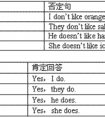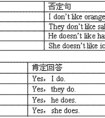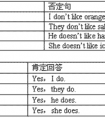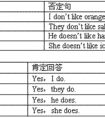用所给词的适当形式填空,完成句子。1.Wouldyoulike (some)tea?2.Theboy (like)loudtalking.3.Look!There (be)apenonthedesk.4.Thismanis(LiMing)father.5. Wouldy-五年级英语
题文
| 用所给词的适当形式填空,完成句子。 |
| 1. Would you like (some) tea? 2. The boy (like) loud talking. 3. Look! There (be) a pen on the desk. 4. This man is (Li Ming) father. 5. Would you like an apple (eat)? 6. The girl is (sing) a song now. 7. May I have some (banana), please? 8. Jenny (say),"Now Danny is loud." 9. Li Lei can (see) the goat. 10. (I) pop is in my stomach! |
答案
| 1. some 2. likes 3. is 4. LiMing's 5. to eat 6. singing 7. bananas 8. says 9. see 10. My |
据专家权威分析,试题“用所给词的适当形式填空,完成句子。1.Wouldyoulike (some)tea?..”主要考查你对 不定代词,复数名词,名词所有格,物主代词,系动词 等考点的理解。关于这些考点的“档案”如下:
不定代词复数名词名词所有格物主代词系动词
考点名称:不定代词
- 不定代词:
不指名代替任何特定名词或形容词的代词,来表示不确定的人、事物或数量。
主要有:all,each,every,both,either,neither,one,none,little,few,many,much,other,another, some,any,no 一般不定代词用法举例:
1.some 一些,某些,某个
不定代词some可以代替名词和形容词,常用在肯定句中作主语、宾语、定语等。作定语时,它可以修饰可数名词(单、复数皆可)和不可数名词。例如:
some are doctors,some are nurses.有些人是医生,有些人是护士。(作主语)
2.any一些,任何
不定代词any可以代替名词和形容词,常用在否定句或疑问句中作主语、宾语、定语等。作定语时,它可以修饰可数名词(多为复数)和不可数名词。例如:
there isn’t any ink in my pen.我的钢笔没有墨水。(作定语)
不定代词any有时也可以用在肯定句中,表示"任何的"。例如:
you may come at any time;i’ll be home the whole day.你任何时候来都行,我整天都将呆在家里 。
不定代词any也可以用作副词,做状语,表示程度。例如:
is he any better today?他今天好一点了吗?
3.all 全体,所有(指三者以上)
不定代词all在句中可以作主语、宾语、表语、定语或同位语。
它可以代表或修饰可数名词和不可数名词。
代表或修饰可数名词时,指两个以上的人或物。
作先行词时,引导词用that。例如:
all were present at the meeting.全都到会了。(作主语,代表可数名词)
4.both 全部,都
不定代词both指两个人或事物。和all一样,可以用作主语、宾语、定语或同位语。例如:
we invited both to come to our farm.我们邀请两个人都来我们的农场?(作宾语)
5.none 无人或无
不定代词none的含义和all物相反,和no one,not any同义,但其用法相当于名词,在句子中一般作主语或宾语。
它代替不可数名词作主语时,谓语动词用单数形式;代替可数名词作主语时,谓语动词用单、复数皆可。例如:
none of the problems is /are easy to solve.这些问题没有一个是容易解决的。(作主语, 代替可数名词)
6.either 两者之中的任何一个,这个或那个。
不定代词 either 可以作主语、宾语和定语。例如:
either of them will agree to this arrangent.他们两人中会有人同意这样的安排的。(作主语)
7.neither 两者都不
不定代词 neither 是 either 的否定形式,可以作主语、宾语和定语。例如:
neither is interesting.两个都没有趣。(作主语)
8.each 每个,各自的
不定代词each指每一个人或事物的个别情况,甚至指这些个别情况各不相同。
它在句中可以作主语、宾语、定语和同位语。例如:
she gave the children two apples each.她给了每个小孩两个苹果。(作the children的同位语。)
9.every 每个,每一的,一切的
不定代词every有"全体"的意思,和all的意义相近,但只能作定语。- some和any的用法比较:
some和any均可代替名词和形容词,作定语时,它所修饰的名词既可以是可数名词,也可以是不可数名词。
some一般用于肯定句或肯定形式的答语中,any一般用于否定句或疑问句中否定形式的答语中。
例:There are some birds in the tree. 树上有一些鸟。
There is some bread in the dish. 盘子里有一些面包。
— Do you have any story-books? 你有故事书吗?
— Yes, I have some. 是的,我有。
— No, I don’t have any. 不,我没有。
no 用在肯定句中表示否定的意思。
例:There are no letters for you today. 今天没有你的信。
考点名称:复数名词
- 复数名词:
指名词的数量大于“一”,如:two books, some students
名词变复数:
1、一般情况下,词尾加s。如:students,apples,bags,trees,books,brothers
2、s,x,z,sh,ch等结尾的名词,词尾加es。如:glasses,boxes,brushes,matches
3、y结尾的名词分两种情况,“辅音字母+y”结尾的名词,将y变为ies;
“元音字母+y”结尾的名词,直接在词尾加s。
以辅音字母加y结尾的名词,变y为i加es:cities,babies,enemies。
以元音字母加y结尾的名词,如:boys
4、f或fe结尾的名词,一般将f或fe变为ves。如:leaf-leaves, wife-wives, knif-knives
5、规则名词:foot→feet,tooth→teeth, child→children,man→men, woman→women,
sheep→sheep,deer→deer, mouse→mice.
- 最新内容
- 相关内容
- 网友推荐
- 图文推荐
| [家长教育] 孩子为什么会和父母感情疏离? (2019-07-14) |
| [教师分享] 给远方姐姐的一封信 (2018-11-07) |
| [教师分享] 伸缩门 (2018-11-07) |
| [教师分享] 回家乡 (2018-11-07) |
| [教师分享] 是风味也是人间 (2018-11-07) |
| [教师分享] 一句格言的启示 (2018-11-07) |
| [教师分享] 无规矩不成方圆 (2018-11-07) |
| [教师分享] 第十届全国教育名家论坛有感(二) (2018-11-07) |
| [教师分享] 贪玩的小狗 (2018-11-07) |
| [教师分享] 未命名文章 (2018-11-07) |






